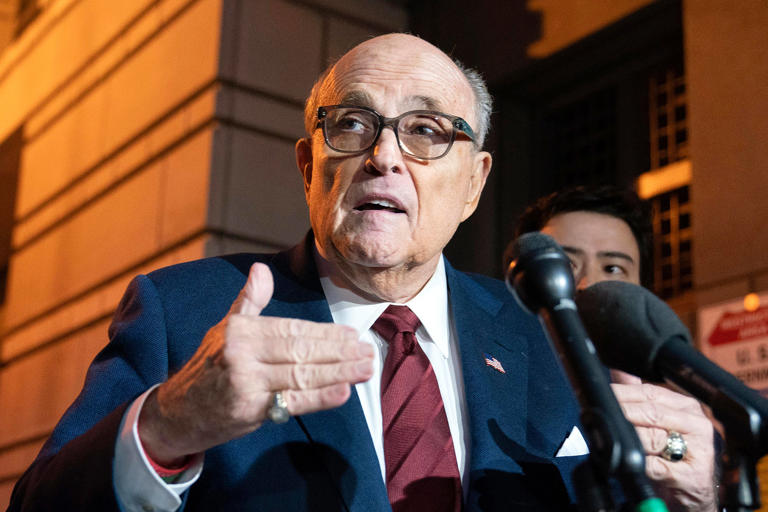“Rudy Giuliani, WABC Radio, 2020 Election, Free Speech, Misinformation, Media Ethics, Giuliani Talk Show Cancellation, John Catsimatidis, Election Fraud Claims, Giuliani Legal Issues”
“Explore the recent suspension of Rudy Giuliani from WABC radio and the cancellation of his talk show following his controversial remarks about the 2020 election. Discover the implications for media ethics, free speech, and misinformation as legal battles and public discourse evolve.”
Rudy Giuliani, a former New York City mayor and personal lawyer to Donald Trump, was recently suspended from WABC radio and had his talk show canceled due to his persistent comments questioning the legitimacy of the 2020 presidential election. This decision marks a significant moment in the ongoing debate surrounding free speech and misinformation.

The radio station’s owner, John Catsimatidis—a billionaire and prominent GOP donor—confirmed the suspension and cancellation of Giuliani’s show to NBC News. Giuliani had been hosting the daily talk show for three years, during which he frequently discussed the 2020 election results. According to Catsimatidis, Giuliani had been previously warned twice by the station management about his on-air remarks.
In a detailed letter addressed to Giuliani, Catsimatidis explicitly stated the conditions of Giuliani’s continued engagement with WABC. The letter prohibited Giuliani from engaging in any conversations related to the 2020 Presidential Election on his WABC programs. This prohibition encompassed discussions on the legitimacy of the election results, allegations of fraud by election workers, and Giuliani’s personal lawsuits related to these allegations.
This action by WABC radio comes in the backdrop of a significant legal battle involving Giuliani. He was mentioned in a news article regarding two Georgia poll workers who were awarded $148 million in damages last year in a defamation lawsuit. They accused Giuliani of making new false statements about the election. In his letter, Catsimatidis highlighted that Giuliani’s repeated claims of fraud were unacceptable on their airwaves, emphasizing the need to avoid the legal and ethical ramifications of such statements.
The decision to cancel Giuliani’s show was not preplanned, as per Catsimatidis, who expressed his regret over the situation, acknowledging Giuliani’s reputation as “America’s mayor.” However, he emphasized the necessity of drawing clear lines when it comes to broadcasting potentially harmful misinformation.
Giuliani responded to the suspension and show cancellation with a statement on Friday, arguing that WABC’s directive was a violation of free speech. He contended that he had not been informed about any such policy previously, and he suggested that if such a policy did exist, it was not enforced consistently, rendering it ineffective.
This incident is part of a larger context where news organizations and media outlets face increasing scrutiny and legal challenges concerning the spread of misinformation. Giuliani himself is facing charges related to his efforts to overturn the 2020 election results in Georgia and Arizona. He has pleaded not guilty to the charges in Georgia, while proceedings in Arizona are still pending.
The suspension of Giuliani’s radio show highlights the complex interplay between free speech rights and the responsibilities of media outlets to prevent the spread of misinformation. It raises critical questions about the role of media in democratic societies, particularly in an era where misinformation can have serious, wide-reaching consequences.
Legal experts suggest that while free speech is a fundamental right, it is not absolute, especially when it involves statements that could potentially cause harm or incite illegal activities. The case of Giuliani and WABC radio serves as a poignant example of the challenges faced by media companies in balancing these considerations.
The incident also reflects the ongoing divisions within the Republican Party and among its supporters regarding the 2020 election results. While some continue to dispute the outcome, others are calling for a move forward, focusing on future electoral strategies and governance issues.
As Giuliani faces legal battles and public scrutiny, the consequences of his claims continue to unfold, affecting not just his career but also shaping public discourse around electoral integrity and truth in media. This situation serves as a reminder of the significant impact that influential public figures can have on public trust and the democratic process.
Read More-
- Apple AI Evolution: Powering Future Innovations with M2 Ultra and M4 Chips
- Leadership Transition at Cornell University: Martha Pollack Retires Amid Ivy League Changes
- The US Department of Education New FAFSA Support Initiative
- Senate Passes $105 Billion FAA Bill: Major Advances in Air Safety and Passenger Services